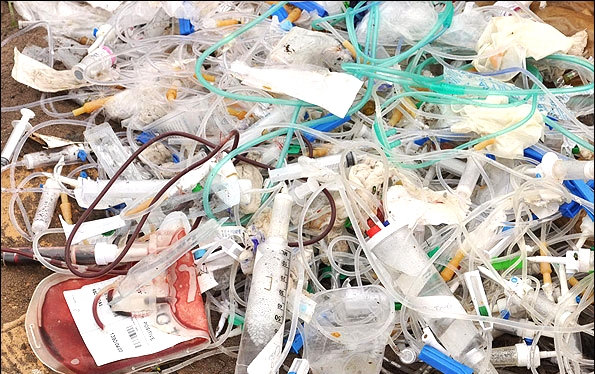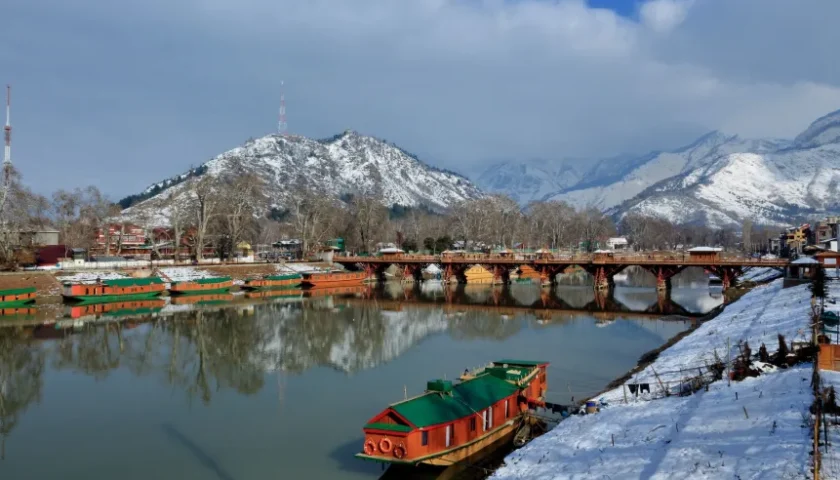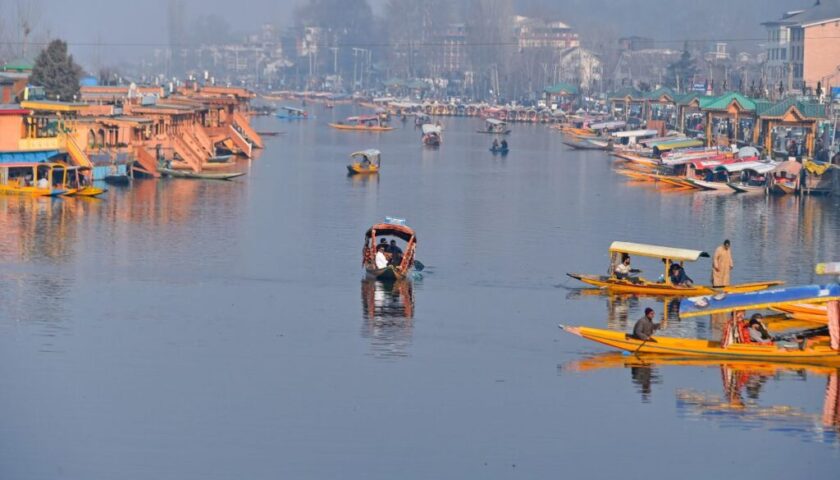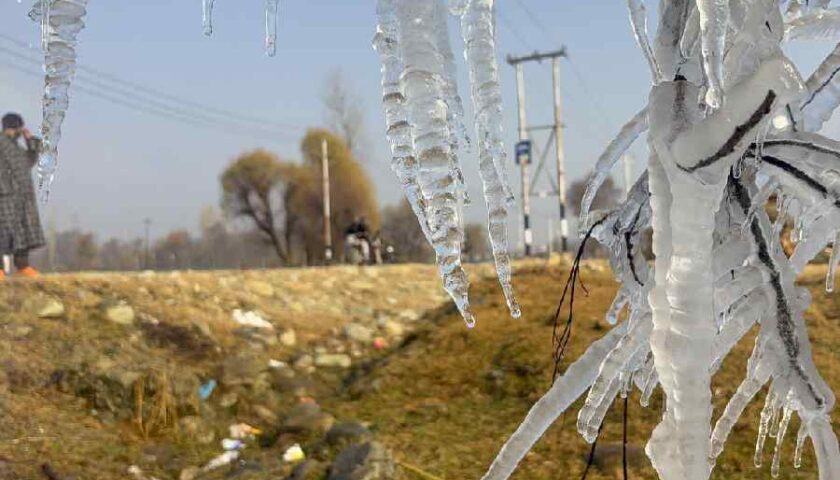50% hospitals fail to comply with Bio-Medical Waste Management & Handling rules
 State Pollution Control Board (PCB) has exposed the grave negligence of health department while dealing with the bio-medical waste in hospitals.
State Pollution Control Board (PCB) has exposed the grave negligence of health department while dealing with the bio-medical waste in hospitals.
According to an official report untreated and neglected medical waste is posing a serious threat to people of contracting deadly diseases in the absence of proper management.
However, health authorities plead helplessness, saying shortage of funds hampered cleaning of the bio-medical waste.
Health institutions are littered with used syringes, needles, plastic items, surgical bandages, unused medicine and saline bottles. Some hospitals are disposing of waste in a haphazard, improper and indiscriminate manner as the implementation of Bio-waste regulation is unsatisfactory. Most of the healthcare institutions have outsourced its disposal to a private organization without taking their undertaking that the waste is disposed of scientifically.
The report prepared by State Pollution Control Board (PCB), reveals that none of the hospitals in Valley generally and in Srinagar especially manages the waste as per the prescribed rules.
“The implementation process of bio-medical waste management rules has been handicapped due to the lack of coordination between various government departments and the departments within the health care institutions. The report says that the management of bio-medical waste should be a priority while making provision of funds for health care institution,” the report informs.
It said mismanagement of the administration in the hospitals and lack of enough funds; and not the non-availability of facilities, is a proving cause of the mess in the waste management in the hospitals here.
“It has been seen that funds often come in the way of proper management of waste. Facilities such as inclinators and STPs available with the government hospitals, more than often fail to serve their purpose due to lack of fuel and proper management,” informs the report.
According to official sources around 50 percent of total health care establishments in Jammu and Kashmir have failed to submit Annual Report about compliance to Bio-Medical Waste (Management & Handling) Rules within the time schedule fixed by the Pollution Control Board.
Moreover, lack of segregation practices results in mixing of hospital wastes with general waste making the whole waste stream hazardous. Inappropriate segregation ultimately results in an incorrect method of waste disposal.
As per the Bio-Medical Waste (Management & Handling) Rules, it is the duty of head/ owner/management of healthcare institution including hospital, nursing home, clinic, dispensary, veterinary institution, animal house, pathological laboratory and blood bank to take all steps to ensure that such waste is handled without any adverse effect on human health and the environment.
“Every hospital has to set up requisite bio-medical waste treatment facilities like incinerator, autoclave, and microwave system for the treatment of waste, or, ensure requisite treatment of waste at a common waste treatment facility,” the rules of the Bio-Medical Waste (Management & Handling) Rules say.
They are also required to submit Annual Report every year carrying the information about the categories and quantities of bio-medical wastes handled during the preceding year after obtaining proper authorization from the Pollution Control Board.
According to these provisions, the J&K Pollution Control Board (PCB) issued a circular directing all the health care establishments (both Government and private) to submit 2014 Annual Report by January 31, 2015, positively.
A senior doctor at GMC Srinagar said the rules, specifies that bio-medical waste should be dumped in a place, which is at least 2.5 km from the hospital, and should be treated in a waste disposal plant.
However, the hospital and its surroundings are littered with bio-medical waste with no proper segregation. Although dustbins kept in the rooms are overflowing, nobody is bothered to remove the rotting refuse.
As per PCB officials SMHS Hospital generates highest biomedical waste among all the hospitals per day. Although the incinerator and autoclaves are available in the hospital, but these are defunct as authorities failed to fulfill guidelines as per PCB directive
As per doctors hospital also lacks color coding as un-segregated waste is sent to the private organization, which results in the incomplete incarnation.
“Hospital waste is also burnt in open in the hospital premises, as the incinerator remains non-functional due to the shortage of fuel,” said a senior PCB official.
He said the board had conducted survey several times which reveals the infectious waste is temporarily stored outside incinerator that is accessible to stray animals.
Similarly, SKIMS generated more than 3000 kg of waste per day, which is kept un-segregated for the treatment. Although incinerators, autoclaves, and STP are available here, but the status of waste management is same as in SMHS hospital. STP in the institute is not being operated properly.
At Lal Ded Maternity Hospital incinerators and autoclaves is available. “But the incinerator remains mostly non-functional due to the shortage of fuel and non-fulfillment of guidelines. Some waste, including Human Anatomical Waste (Placenta, etc.) is thrown away on the banks of river Jehlum,” the official said. Here also, colour coding is not maintained in every ward and the needle cutter is available in selected areas only.
At SKIMS Medical College Hospital, Bemina there are only autoclaves available. The present status of the waste management in the hospital shows that un-segregated waste remains scattered in the open and is easily accessible to rag-pickers and animals.
As per the insiders, the infectious waste is stored beyond 48 hours in the hospital.
The Chest Diseases Hospital at Dalgate and GB Pant hospital at Sonwar has no treatment facility available. The highly infectious waste from this hospital is handed over to SMC and BB Cant Board after storing it beyond 48 hours. Some of the waste is handed over to a private organization Kashmir Healthcare Services Ltd which dumps it in Lassipora Pulwama.
The Bone and Joint Hospital at Barzulla has incinerator and autoclaves available. But incinerator is not functional. Colour also not proper as waste is stored beyond 24 hours, remains easily accessible to animals and birds.
In JLNM Hospital, Rainawari, only one waste treatment facility (autoclaves) is available. Infectious waste is partially burnt in open and the remaining quantity is dumped in hospital backyard.
As per the report by PCB the management of bio-medical waste management is the least priority in Srinagar hospitals. The report suggests that personnel from areas such as housekeeping, laundry, kitchen and others with the institution should be involved in the waste management.
People and doctors coming to these hospitals face immense problems due to the accumulation of bio-medical garbage.
“The respective hospital administration act as mute spectators to this serious problem. The hospital is run by the government and it should have proper means to dispose of the bio-medical waste that puts patients at risk,” said a resident doctor wishing not to be named.
He said rag-pickers, who roam freely in hospital premises, might get their hands pricked by any used syringe. “So they are exposed to the risk of diseases like AIDS or Hepatitis B,” he said.
According to doctors inadequate Bio-Medical waste management cause environmental pollution, unpleasant smell, growth and multiplication of vectors like insects, rodents, and worms and may lead to the transmission of diseases like typhoid, cholera, hepatitis and AIDS through injuries from syringes and needles contaminated with the human.
The need of proper hospital waste management system is of prime importance and is an essential component of quality assurance in hospitals.
When contacted a senior health official he expressed helplessness saying PCB doesn’t issue safety certificate to any of the hospitals which hampered disposing of the bio-medical waste.
“We have now outsourced the medical waste to a contractor who collect bio-medical waste from the hospital dumping sites and then dispose of that,” he said.
According to him, incinerator and autoclaves were available in many hospitals. “However, those remain shut due to negative response from PCB.




